Muckamore Abbey Hospital: Bad practices 'allowed to persist'
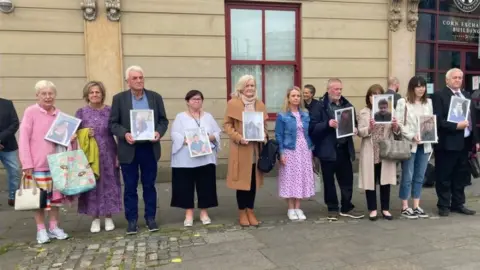 BBC
BBCBad practices were allowed to persist at Muckamore Abbey Hospital, the chairman of a public inquiry into allegations of abuse has said.
Tom Kark QC said that was to the detriment of patients who were, without exception, highly vulnerable.
He was delivering his opening statement to the inquiry which began public hearings in Belfast on Monday.
The families of those affected lined up outside the inquiry building holding pictures of their loved ones.
Inside, the inquiry chair, who had a key role in the inquiry into avoidable deaths at Stafford Hospital, said it was the job of those in authority to keep people safe.
"What happened at Muckamore Abbey hospital has been referred to as a scandal and without predetermining any issue it is quite obvious that bad practices were allowed to persist at the hospital to the terrible detriment of a number of patients," Mr Kark said.
"Those patients themselves were all, without exception, highly vulnerable in different ways and so it is understandable that there is considerable public anger at some of what has already been revealed.
"Relatives and carers who entrusted their loved ones to the hospital to be cared for with compassion have discovered that in many cases that's not what was happening.
"Because so many of the patients were either non-verbal or had difficulty communicating they couldn't express what was happening or they were not regarded as credible."
Allegations of abuse
Muckamore Abbey Hospital is also at the centre of the UK's biggest-ever police investigation into the abuse of vulnerable adults.
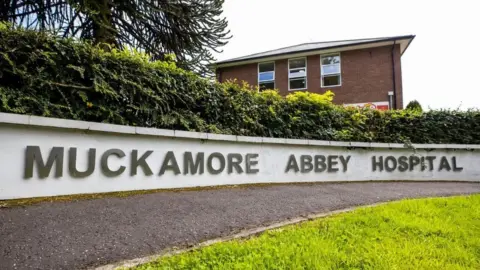 PA Media
PA MediaSome staff working at the County Antrim hospital are alleged to have carried out physical and mental abuse as well as "wilful neglect" of vulnerable patients.
Detectives have viewed about 300,000 hours of CCTV footage from inside the hospital.
Police have arrested 34 people; so far eight people have been charged, and more than 70 staff have been suspended as a precaution.
Patients 'at front and centre of inquiry'
Mr Kark told the public inquiry that many of the parents and relatives and carers who had trusted the hospital had been "let down".
He added: "Today is the culmination, in some respects, but in others it's just the start of a massive effort by those closely affected by and involved with Muckamore Abbey Hospital to have an inquiry which will scrutinise what was happening at the hospital, over many decades.
"I regard the patients and their relatives and carers, who have been abused or received poor care, as being at the front and centre of this inquiry.
"Getting to the bottom of what's been happening at Muckamore would be quite impossible without hearing about the experiences of patients, either directly from those patients or from their loved ones."
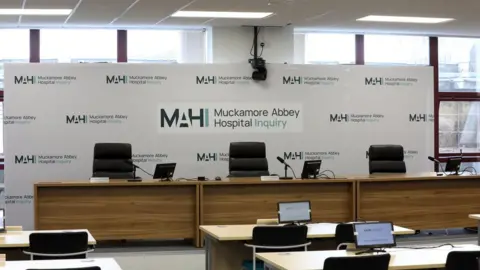 Press Eye
Press EyeHe said the central purpose of such an inquiry was to find out what happened and how it was allowed to occur.
"The essence of our function is to explore the evidence and to construct sensible recommendations which will ensure that patients are well treated and cared for at Muckamore and at similar institutions in Northern Ireland."
'We will uncover what has gone wrong'
The inquiry was told that clearly some of the families "felt furious and others felt guilty".
"This public inquiry requires cool and calm reflection. I will do whatever I can to ensure this is a safe space for all who give evidence and who attend", Mr Kark said.
Speaking to the BBC after his opening remarks, Mr Kark said the inquiry was important for the wider health service as well as those directly affected.
"I'm very lucky that I've got two experts with me who really understand about the delivery of care to patients of this nature and so I have no doubt at all that we will turn over the stones and we will uncover what has gone wrong here."
He added: "There's absolutely nothing to stop us naming and shaming if we feel that's appropriate and, yes, people will be held to account when we write the final report."
The inquiry also heard how Mr Kark visited the mother of a patient who had been a resident in Muckamore before she died in order to gather evidence.
Margaret Lyons died on 10 February.
Her son, Richard, had been admitted to the hospital in 1992 and passed away in 2021. He died on his 46th birthday.
Mrs Lyons had put her memories in writing as she said "she wanted to leave a lasting record for her son".
Sean Doran QC, counsel to the inquiry, said it was important "to remember all those who had died and could not be part of this significant inquiry".

Analysis: Marie-Louise Connolly, health correspondent
It is critical that those with a learning disability have their voices heard - and it shouldn't take a public inquiry to hear what they have to say.
The Muckamore Abbey Hospital crisis makes for uncomfortable reading.
For decades this institution has been home to hundreds of men and women.
It was a place which was supposed to care and protect vulnerable adults, but for some it meant abuse and cruelty.
Families have told me that they didn't want their loved ones to call Muckamore home, but for so long there wasn't anywhere suitable for them in the community.
Recently a man who had lived there for 47 years - since the age of nine - was rehoused in an ordinary house.
There is a great deal of expectation about Northern Ireland's latest inquiry into its health and social care system.
Families want and deserve answers.
How was this allowed to happen? Who knew it was happening? And who allowed it to continue?
This inquiry is not just about Muckamore.
Instead it is about the system and those in charge of it.
There are many pertinent questions around who was in charge; the accountability and the role played by various boards.
In February 2019, then-chief executive of the Belfast Trust, Martin Dillon, told the BBC that some of what had happened was "a source of shame".
He said his primary focus was to "put things right".
This public inquiry will hopefully yield answers and help Northern Ireland turn a corner in how it protects those who rely on us to protect them.

Glynn Brown went public about his own son's experience in 2017.
Speaking to BBC News NI he said: "This is the worst adult safeguarding scandal since the NHS was formed.
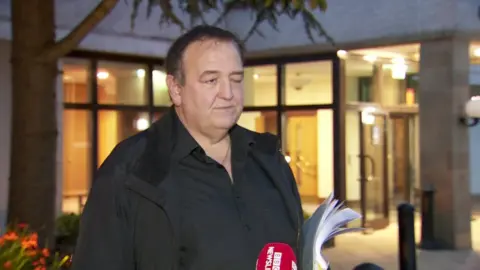
"I shouldn't have had to push and prod and keep raising for this inquiry to be opened but I did.
"Once they realised this was a massive scandal with vulnerable people they just should have launched a public inquiry.
"There have been catastrophic failures in all directions and in all departments. It goes to the very top.
"We want to know how come every protection measure that was in place failed so miserably."
In December 2018, a catalogue of abuse and neglect in the hospital was revealed in a report leaked to BBC News NI.
The review, A Way To Go, was commissioned by the Belfast Trust to examine safeguarding at the hospital between 2012 and 2017.
Among its findings were that patients' lives had been compromised, staff did not follow safeguarding protocols and that CCTV footage showed patients being harmed by staff.
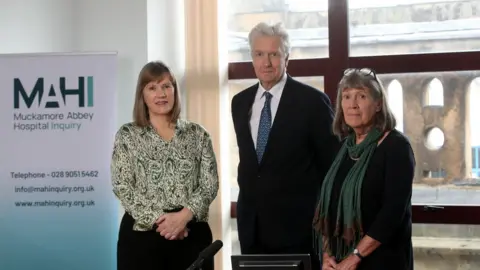 Press Eye
Press EyeThe inquiry will establish what happened between residents and some members of staff, to examine management's role and ensure that such abuse does not happen again at the hospital or any other institution.
The inquiry is to be wholly independent and not accountable to the Department of Health, the Stormont Executive, the Northern Ireland Assembly or any public body.
